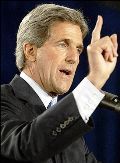Bush, Kerry feud over Vietnam, economy, Iraq, Darfur
 WASHINGTON, Sept 10 (AFP) — U.S. President George W. Bush and Democratic White House hopeful John Kerry sparred on the economy, the Iraq war and the humanitarian crisis in Darfur, and continued their war of words over Bush’s national guard stint to avoid the Vietnam War.
WASHINGTON, Sept 10 (AFP) — U.S. President George W. Bush and Democratic White House hopeful John Kerry sparred on the economy, the Iraq war and the humanitarian crisis in Darfur, and continued their war of words over Bush’s national guard stint to avoid the Vietnam War.
Two days before the third anniversary of the September 11 strikes by Osama bin Laden’s Al-Qaeda network, Kerry accused Bush of focusing on Iraq at the expense of other priorities like hunting down the elusive terrorist mastermind. Campaigning in Iowa, Kerry warned that North Korea is “more dangerous than it was before,” Iran is being “ignored,” and that Iraq has “diverted” resources from “the real war on terror in Afghanistan and getting Osama bin Laden.”
 In Pennsylvania, Bush defended the 1.7 trillion-dollar tax cuts at the heart of his economic program and told supporters that Kerry’s pledge to roll back reductions for just the top two percent of earners could not be trusted. The president cited his campaign’s calculation that Kerry had proposed two trillion dollars in new spending but would raise only 650 billion, and drew cheers when he asked rhetorically: “Guess who would wind up paying the bill?”
In Pennsylvania, Bush defended the 1.7 trillion-dollar tax cuts at the heart of his economic program and told supporters that Kerry’s pledge to roll back reductions for just the top two percent of earners could not be trusted. The president cited his campaign’s calculation that Kerry had proposed two trillion dollars in new spending but would raise only 650 billion, and drew cheers when he asked rhetorically: “Guess who would wind up paying the bill?”
And both candidates weighed in on the burgeoning humanitarian crisis in Sudan’s troubled Darfur region.
Bush said he was appalled by the violence, reiterating the U.S. government’s conclusion that genocide has taken place in Darfur.
“Our government has led the international effort to end the suffering there by speaking clearly about the crisis and sending assistance to the suffering,” he said in a White House statement.
Kerry, campaigning in New Orleans, Louisiana, said the United States should not allow Darfur to repeat the 1994 genocide in Rwanda.
“We simply cannot accept another Rwanda,” said Kerry. “The United States should ensure the immediate deployment of an effective international force to disarm militia, protect civilians and facilitate delivery of humanitarian assistance in Darfur. “If I were president, I would act now…I would not sit idly by.”
With less than two months before the November 2 election, Bush got good news from a new poll showing him ahead of Kerry among likely voters in Missouri and Ohio, rich prizes among the battleground states.
The USA Today/CNN/Gallup survey found Bush up 55-41 in Missouri and 52-44 in Ohio, while Kerry was ahead 52-44 in Washington and locked in a statistical dead heat with the incumbent in Pennsylvania.
Kerry aides said the poll, which had an error margin of four percentage points, came too soon after the Republican National Convention in New York to be reliable and insisted that the race would soon revert to a dead heat.
A new survey by Fox News/Opinion Dynamics found that the convention had bolstered Bush’s national poll standings by just three percentage points, giving him a 47-45 edge with an error margin of three percentage points.
In Congress, however, Bush took a hit as the House of Representatives joined the Senate voting 223-193 to restore overtime pay to an estimated six million U.S. workers that was taken away when by Bush’s new overtime regulations went into effect on August 23. Kerry called the vote “a huge victory for working Americans” underscoring the bipartisan opposition Bush’s “war on overtime pay.”
On another front, the two campaigns exchanged verbal broadsides over new fuel for charges Bush’s family connections got him into the Texas National Guard and that he shirked his duties while in the guard.
“You absolutely are seeing a coordinated attack by John Kerry and his surrogates on the president. The polls show Senator Kerry falling behind, and it’s the same old recycled attacks that we’ve seen every time the president has been up for election,” Bush spokesman Scott McClellan told reporters.
McClellan “seems to have lost his cool. Rather than deal with real issues with real candor, Mr McClellan is resorting to hurling nonsensical, inaccurate and baseless charges at the Kerry campaign,” countered Kerry adviser Joe Lockhart.
The fresh flap over the Vietnam War came after Kerry faced a Republican-funded group’s allegations that he embellished his exploits in Vietnam, where he won five medals and was wounded three times.
